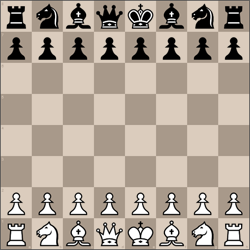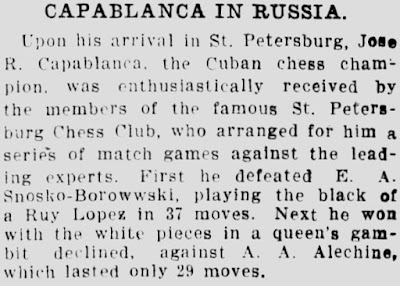Alexander Alekhine, 1914 (Source)
Alexander Alekhine, 1914 (Source)
January 1914
January 04 1914
Two world chess champions, Jose Capablanca and Alexander Alekhine playing a game of chess in St. Petersburg, Russia, (?)September 14, 1914.
The Brooklyn Daily Eagle, Brooklyn, New York, Sunday, January 04, 1914
Capablanca In Russia.
Upon his arrival in St. Petersburg, Jose R. Capablanca, the Cuban chess Champion, was enthusiastically received by the members of the famous St. Petersburg Chess Club, who arranged for him a series of match games against the leading experts. First he defeated E. A. Snosko-Borowski, playing the black of a Ruy Lopez in 37 moves. Next he won with the white pieces in a queen's gambit declined, against A. A. Alechine, which lasted only 29 moves.
January 08 1914
Translated from the Russian: Bogatyrchuk's rivals in the Kyiv championship - Alexander Evenson and Efim Bogoljubov at the All-Russian Masters Tournament in St. Petersburg (1913/14). Below: Malyutin, P.A. Saburov, Kutler and Levenfish. Above: Alapin, Evenson, Flamberg, Alekhine, Gregory and Bogolyubov (Niva No. 7, 1914).
January 11 1914
January 12 1914
January 16 1914
January 19 1914
January 21 1914
January 22 1914
January 23 1914
January 27 1914
January 29 1914
January 30 1914
February 05 1914
February 06 1914
March 28 1914
April 04 1914
The Observer, Adelaide, South Australia, Australia, Saturday, April 04, 1914
Russian National Tournament.
The St. Petersburg Jubilee National Tournament has come to a conclusion. It was evident almost from the very beginning that the struggle for first place would be between Alechin, Niemzowitsch, Flamberg, Bogoljubov, Levenfisch, and Lowtsky; but gradually the first three of these came to the front, and the finish was an exciting one. In the last round but one Flamberg was leading, but in the final round he spoilt his chance by losing to Snosko-Borowsky. In consequence of this, instead of winning the first prize, he only came out third, being half a game behind Alechin and Niemzowitsch, who tied for first and second places. The remaining prize winners were:—Lowtzky fourth, Lowenfisch fifth, Snosko-Borowsky and Smorodsky tie for sixth and seventh, Bogoljubov eighth, and Evenssohn ninth. The prizes were 500, 375, 275, 200, 150, 120, 100, 85 and 75 roubles. Regret will be felt that Salwe and the veteran Alapin were not more fortunate. They did well against the prize winners, and came out just below them, with scores of eight and a half each, having won exactly half their games. They are both experienced international players, and their position in the tournament shows how strong it really was. Lowtsky was only fourth among the non-prize-winners, his position on this occasion not having fulfilled the promise of his excellent performance at Breslau. Alechin and Niemzowitsch will now have to play off their tie for first and second prizes in a match of four games, and the winner will be entitled to compete in the grand international masters' tournament, to take place in St. Petersburg next April.
The foregoing is taken from the last number of The Field. In August last, after Alechin had won first prize in the Dutch International Chess Congress at Scheveningen, the last Mr. Leopold Hoffer wrote as follows in The Field:—“We have the greatest admiration for the youthful master, and have no hesitation in predicting that he will attain the highest pinnacle of fame. Alexander Alechin, born in Moscow, is only 22 years of age, and has a promising and progressive record. In 1907 he played for the first time in a strong local tournament, gaining the third prize, Blumenthal and Niemzowitsch being first and second. In 1908 he took fourth prize in the Haupt tournament at Dusseldorf, and won a match against Bardeleben and Blumenthal. The following year he won first prize of honour given by the Czar. He played in the International Masters' Tournament of 1910 at Hamburg, dividing seventh and eighth prize with Dus-Chotimirsky. We mentioned at the time that he had to be carried to the chess rooms owing to an accident to his foot. In 1911, at Carlsbad, he won one of the lower prizes. In 1912, at the International Masters' Tournament at Stockholm, he was first, Mieses, Cohn, and Dr. Olland coming below him in the order named. Lately he won a match against Levitsky by seven games to three, and the first prize on this occasion, in grand style.”
Appended is another good specimen of Alechin's forceful style of play. It occurred in the late Russian national tournament:—
Georg Salwe vs Alexander Alekhine
All-Russian Masters (1914), St. Petersburg RUE, rd 5, Jan-11
Tarrasch Defense: Symmetrical Variation (D32) 0-1
The Weekly Times, Melbourne, Victoria, Australia, Saturday, April 04, 1914
Russian National Tournament—In the match, which was to have consisted of four gaames, to decide the tie for first and second places, Alechin won the first game and Niemzowitsch the second, whereupon the latter proposed that, with the consent of the committee, the match should be declared a draw, and the right to compete in the international tourney, to be held this month, was granted to both. General satisfaction will be felt at the decision, as it would have been a loss to chess if either of these fine players had been excluded.
April 21 1914
The Guardian, London, Greater London, England, Tuesday, April 21, 1914
International Tournament at St. Petersburg.
From Our Correspondent.
St. Petersburg, Monday Night.
One of the strongest international tournaments held of recent years opens here tomorrow with an entry of eleven of the world's strongest players, representing chess interests in every capital.
For the first time for a considerable period the world's champion, Dr. E. Lasker, will take part in an open event, and his competitors include only those who have won at least one international tournament previously.
The entries, numbering eleven, are as follows:—Lasker (world's champion), Janowski, Tarrasch, Gunsberg, Blackburne, Niemzowitsch, Marshall, Alechin, Rubinstein, Bernstein, and—most interesting of all—Capablanca, the latest chess genius.
Intense interest is being taken in the tournament here. Several members of the Imperial Court are expected to patronise the daily sitings. England is represented by Gunsberg and Blackburne. The encounters between Capablanca and Lasker are looked forward to with very keen and excited interest.
Participants in the Saint Petersburg Chess Tournament of 1914.
St. Petersburg International Chess Tournament, April 21, 1914 – May 22, 1914.
St. Petersburg 1914 was organized by the St. Petersburg Chess Society to commemorate its tenth anniversary. It invited the world’s top twenty players, but Amos Burn, Richard Teichmann, and Szymon Winawer declined for personal reasons. Oldrich Duras, Geza Maroczy, Carl Schlechter, Rudolf Spielmann, Savielly Tartakower, Milan Vidmar, and Max Weiss, on the other hand, declined due to tensions between Russia and Austria-Hungary.
The remaining eleven, nonetheless, made a formidable cast. These included the world champion in Emanuel Lasker, the leading title contenders in Akiba Rubinstein and Jose Raul Capablanca, former world championship contenders in Isidor Gunsberg, Frank Marshall, Siegbert Tarrasch, and David Janowski, a 19th century great in Joseph Henry Blackburne, a leading Russian master in Ossip Bernstein, and the joint winners of the 1913 All-Russian Masters Tournament in Alexander Alekhine and Aron Nimzowitsch.
Source: Chessbase, Revisiting St. Petersburg 1914
“The St Petersburg Tournament of 1914 featured the joint winners of the 1914 All Russian Championship (Alekhine and Nimzowitsch) and players who had won at least one major tournament. There were the veterans Blackburne and Gunsberg, established masters such as Tarrasch, Bernstein, Janowski, Nimzowitsch, Alekhine and Marshall as well as the World Champion Lasker and his two most prominent rivals, Rubinstein and Capablanca.
The tournament was divided into two sections. The first stage from the 21st April to the 6th of May was an all-play-all event with the first five finishers proceeding into the second stage which ran from the 10th to the 22nd of May. This second stage was a double round all-play-all with the scores from the preliminaries being carried over to the final.
It was expected that there would be a great struggle among Lasker, Capablanca and Rubinstein, but the latter failed to make the final, leaving Lasker and Capablanca to battle it out. Lasker was 1½ points behind Capablanca at the start of the finals but in the end ran out the winner by a ½ point, by scoring seven points from eight games, including a celebrated victory over Capablanca.”
Source: Chessgames.com: St. Petersburg (1914)
April 22 1914
April 24 1914
April 26 1914
April 28 1914
April 29 1914
April 30 1914
May 03 1914
May 05 1914
May 06 1914
May 10 1914
May 11 1914
May 12 1914
May 15 1914
May 17 1914
May 18 1914
May 19 1914
June 10 1914
June 13 1914
June 14 1914
July 15 1914
July 20 1914
Participants and organizers of the tournament in Mannheim, 1914. Seated (from left to right): Mieses, ?, Chairman of the German Chess Union Gebhardt, Tarrasch and Spilman. Behind them stand: Janowski, Farny, ?, Vidmar, Duras, Bogoljubov, Marshall, ?, ?, ?, Tartakower, ?, Alekhine, Breyer and Reti. Behind Alekhine stand Flamberg and Malyutin (in a light suit).
July 21 1914
July 22 1914
July 23 1914
July 24 1914
July 27 1914
July 28 1914
July 29 1914
July 30 1914
July 31 1914
August 1914
August 01 1914
October 1914
October 21 1914
November 20 1914
December 21 1914
December 28 1914
Related Links
- Wikipedia, Alexander Alekhine
- Alekhine Biography
- Alexander Alekhine, Chessgames index
- Britannica, Alexander Alekhine
- World Chess Hall of Fame, Alexander Alekhine
- The Best Chess Games of Alexander Alekhine
- Chessbase, Alexander Alekhine
- Ten Things to Learn From Alexander Alekhine
- Agadmator on Alexander Alekhine
- Alexander Alekhine
- Alexander Alekhine
- NIC Podcast: Alexander Alekhine, the Paris Years
- Alexander Alekhine, Wikipedia
- Google Art and Culture: Alexander Alekhine
- Alexander Alekhine
- Chessbase Investigates Alekhine
- Alexander Alekhine, Master In Chess
- Spark Chess: Alexander Alekhine
- Alexander Alekhine, Chess Genius
- Alexander Alekhine Attacking Rules
- Triumph and Tragedy of Alexander Alekhine
- Talk with Alexander Alekhine (Gab AI)
- Open Chess: Alexander Alekhine
- RChess: Alexander Alekhine
- Britannica, Alekhine
- Alekhine Memorial
- Alexander Alekhine--Attacking Chess
- ChessMate: Alexander Alekhine



































